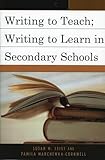Writing to teach, writing to learn in secondary schools / Susan M. Leist, Pamila Marchewka-Cornwell.
Material type: TextPublisher: Lanham : University Press of America, c2006Description: 133 p. ; 23 cmISBN: 9780761835226 (pbk. : alk. paper); 0761835229 (pbk. : alk. paper)Subject(s): English language -- Composition and exercises -- Study and teaching (Secondary) -- United States | Report writing -- Study and teaching (Secondary) -- United States | English teachers -- Training of -- United StatesLOC classification: LB1631 | .M587 2006
TextPublisher: Lanham : University Press of America, c2006Description: 133 p. ; 23 cmISBN: 9780761835226 (pbk. : alk. paper); 0761835229 (pbk. : alk. paper)Subject(s): English language -- Composition and exercises -- Study and teaching (Secondary) -- United States | Report writing -- Study and teaching (Secondary) -- United States | English teachers -- Training of -- United StatesLOC classification: LB1631 | .M587 2006| Item type | Current library | Call number | Copy number | Status | Notes | Date due | Barcode |
|---|---|---|---|---|---|---|---|
 Books
Books
|
Female Library | LB1631 .M587 2006 (Browse shelf (Opens below)) | 1 | Available | STACKS | 51952000112990 | |
 Books
Books
|
Main Library | LB1631 .M587 2006 (Browse shelf (Opens below)) | 1 | Available | STACKS | 51952000137344 |
Browsing Main Library shelves Close shelf browser
Includes bibliographical references (p. [129]-131) and index.
1. The writing process: creating the writing intensive course -- 2. Techniques of using writing to teach: Heuristic writing ; Seven principles of good teaching and WAC ; Suggestions for improving final student writing products ; Check work in progress ; Use a check sheet ; Use peer groups ; Suggestions for ungraded writing ; Uses for ungraded writing assignments and related benefits ; Structuring formal writing assignments ; Plan assignment objectives carefully ; Creating writing assignments -- 3. Generative heuristics: Free writing ; Sharing free writing ; Focused free writing ; Looping ; The nine-line composition ; Brainstorming/listing ; Clustering/webbing/mind-mapping -- 4. Structural heuristics: Definition ; Process analysis ; Classification/division ; Comparision/contrast ; Analogy ; Causal analysis ; The cubing heuristic -- 5. Student research: The "I-search" assignment -- 6. Evaluating student writing: Determining when and how to grade ; Grading strategies ; Some assessment options ; Understanding the domains of writing and their hierarchy ; Preparing assignments carefully ; Evaluating the papers ; Dealing with errors ; Incorporating writing into pedagogy -- Appendix A. Syllabi for writing intensive courses: I. COMM 332W: Contemporary issues in broadcasting ; II. NFS105: Food and people: interactions and issues ; III. BIO405: Organic evolution ; OEC 301W: Principles of occupational education -- Appendix B. Some examples of writing assignments ; Generic writing intensive assignments ; Course specific writing intensive assignments -- Appendix C. Forms and checklists ; A checklist for evaluating compositions ; Peer or teacher edit sheet ; Peer conference checklist ; Revision response checklist ; Portfolio evaluation -- Appendix D. The domain scoring rubric ; Domains and features ; Domain scoring -- Appendix E. Directions for generally used writing tasks ; Sample sets of directions for generally used writing tasks ; Tips for preparing a book review -- Writing summaries ; The microtheme.
1 2







There are no comments on this title.